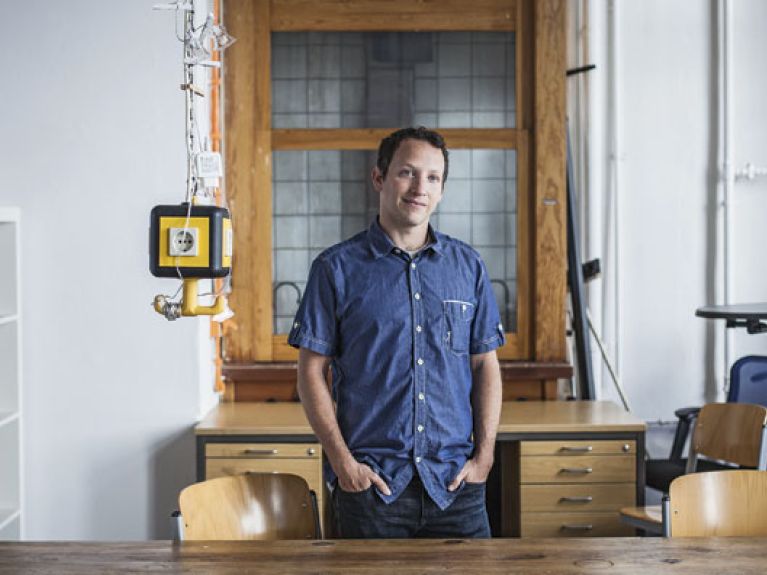Israeli founders in Berlin
The EXIST Start-Up Germany project is also funding foreign start-ups for the first time: Ran Oren from Israel is one of the pioneers with his Pin2Pin platform.

Ran Oren’s new office is so full of Berlin stereotypes, it would be almost impossible to reproduce. Outside, the paint is peeling from the window frames and on the way into the second courtyard a surprisingly undamaged notice on the wall reminds you of past times: “Storing objects in the passage is prohibited by order of the police”. Inside, school display cabinets that date back to the GDR era and exposed, bright orange electricity cables form the backdrop for information from the 21st century: Underground, the book by Julian Assange and Suelette Dreyfus, lies next to brochures about crowd funding and insurance company leaflets, while posters invite you to attend Kitchenpitch, the monthly founder event of the Humboldt-Universität zu Berlin (HU). Welcome to the HU Founders House in the centre of Berlin.
Ran Oren, a 35-year-old computer scientist from Israel, now sits by the window with a view of the inner courtyard, which is even rather small by Berlin standards. Only last winter he had a solid full-time job in data security in Tel Aviv. Before that he worked in a business start-up. Although it was unable to successfully realise its basic idea, he has not been able to get it out of his head ever since. Shouldn’t it be possible to bring together on one platform the producers of individual electronic components and the manufacturers who use them? From smartphone producers to automakers, companies need hundreds if not thousands of individual electronic parts, explains Oren: “There are countless manufacturers of electronic components, but practically no distributors that make sure the right company finds out about them. On the other hand, production can come to a complete halt if a single part becomes unavailable.”
In any event, that was the business idea that popped back into his head when he heard of a new offer through the meetup.com website. For the first time, graduates of foreign universities were asked to apply for grants in Germany as part of the EXIST start-up programme, which was launched in 1998. Young people in Israel were chosen for the two-year pilot phase – not entirely coincidentally it would seem as the country has the highest start-up density in the world. The programme was presented by Brigitte Zypries, the State Secretary at the responsible Ministry of Economic Affairs, and Christian Thomsen, the President of Technische Universität Berlin (TU), in July 2015.
Ran Oren and his partner at that time were among the first eleven teams of founders that were invited to Berlin in February. Over three days they met with representatives of the five participating universities in Berlin and Potsdam, received coaching and eventually presented a final pitch, after which five of them were chosen. The jury included business advisors from the participating universities who work, for example, at the HU Founders House or at the so-called incubator at TU Berlin. Lisa Breford, the coordinator of EXIST Start-Up Germany based at TU Berlin, explains: “Their experience enables them to best judge whether an idea is promising or a team is not yet ready – or has already progressed too far.” EXIST founder grants are targeted at graduates who already have a good idea and a rough business plan. It gives them financial support for one year so they can develop a detailed strategy and work on the actual application with a mentor from a university.
There were clear reasons for Oren to apply: the huge potential market in Germany, the large number of international creative minds in Berlin and the academic partners. “Perhaps the start-up culture in Israel is so strong because we know insecure conditions. We live in them,” says Oren. Nevertheless, a start-up is still a risky business: “So what could be better than having such a solid partner by your side as the academic world?” In addition, he explains, he has a mentor, Björn Scheuermann, Deputy Director of the Institute of Computer Science at the HU, whose start-ups have all succeeded until now.
In the end, Oren’s co-founder stayed in Israel. “It’s not an easy decision to leave your country,” explains Oren, “Many Israelis have very close ties with their families, and if they have their own children, the step is even greater.” In fact, only two of the five teams chosen in February have followed through. The fact that teams occasionally drop out is “basically normal”, says Breford, “Some eventually don’t have the courage, while others discover they need a different approach.” That three out of five gave up is certainly also due to the large amount of time involved in putting together the final EXIST application, which follows on from the EXIST Start-Up Germany phase. “How innovative the idea is and whether there is a market for it are subjected to very close scrutiny,” says Breford. Unlike German teams, who are familiar with these kinds of processes, it has emerged that Israeli teams find them a significant hurdle.
In addition to Pin2Pin – that is the name Ran Oren has chosen for his business – another B2B start-up from the first round is currently being prepared. Four more projects were recently selected in a second round. The third call for proposals begins on 1 November. ▪

